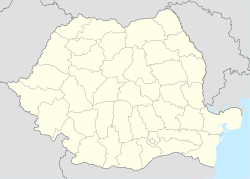Castra of Hoghiz
| Castra of Hoghiz | |
|---|---|
 View from Ungra (2013) | |
| Known also as | Castra of Ungra |
| Founded | 2nd century AD[1][2] |
| Abandoned | 3rd century AD[1][2] |
| Place in the Roman world | |
| Province | Dacia |
| Administrative unit | Dacia Apulensis |
| Administrative unit | Dacia Superior |
| Limes | Alutanus ? |
| Nearby water | Alutus |
| Directly connected to | |
| Structure | |
| — Stone structure — | |
| Size and area | 220 m × 165 m (3.6 [3] ha) |
| Stationed military units | |
| — Legions — | |
| — Cohorts — | |
| III Gallorum[5] | |
| — Alae — | |
| I Asturum[3][6] | |
| — Numeri — | |
| Illyricorum[7] | |
| Location | |
| Coordinates | 45°58′41″N 25°16′44″E / 45.977956°N 25.278792°E |
| Altitude | 460 m (1,509 ft) |
| Place name | La cetate |
| Town | Hoghiz |
| County | Brașov |
| Country | |
| Reference | |
| RO-LMI | BV-I-m-A-11280.02 [2] |
| RO-RAN | 41186.01 [1] |
| Site notes | |
| Recognition | |
| Condition | Ruined |
| Excavation dates |
|
| Archaeologists | |
The castra of Hoghiz was a fort in the Roman province of Dacia.[1] The fort was built in the 2nd century AD, on the left bank of the Olt River, at a place where a Dacian settlement existing already in the 2nd century BC was unearthed.[2] The fort and the nearby village were abandoned in the 3rd century AD. The ruins of the castra are located in Hoghiz, Romania.


Gallery[edit]
See also[edit]
Notes[edit]
- ^ a b c d "41186.01". National Archaeological Record of Romania (RAN). ran.cimec.ro. 2009-09-17. Archived from the original on 17 August 2014. Retrieved 7 January 2013.
- ^ a b c d "Lista Monumentelor Istorice 2010 ("2010 List of Historic Monuments")" (PDF). Monitorul Oficial al României, Partea I, Nr. 670 ("Romania's Official Journal, Part I, Nr. 670"), page 582. Ministerul Culturii şi Patrimoniului Naţional. 1 October 2010. Archived from the original (PDF) on 10 June 2012. Retrieved 7 January 2013.
- ^ a b Ureche, Petru. "Tactică, strategie şi specific de luptă la cohortele equitate din Dacia Romană" (PDF). www.irregular.ro. Retrieved 7 January 2013.[permanent dead link]
- ^ "Hoghiz". STRATEG. Archived from the original on 2012-10-16. Retrieved 2013-05-05.
- ^ "Hoghiz, com./oraş Hoghiz (denumire repertoriu: Hoghiz sau Olthéviz. Homorodhéviz, Héviz, jud. Târnava Mare)". "Archaeological Repertory of Romania" Archive Of The "Vasile Parvan" Institute Of Archaeology: Site Location Index, page 10. www.cimec.ro. 2012-08-06. Archived from the original on 2012-09-28. Retrieved 7 January 2013.
- ^ Bejan, Adrian (1998). Dacia Felix: Istoria Daciei romane ("Dacia Felix: A History of Roman Dacia") (PDF) (in Romanian). Timişoara. Archived from the original (PDF) on 2012-03-15.
{{cite book}}: CS1 maint: location missing publisher (link) - ^ a b Costea, F. (2004). Repertoriul arheologic al județului Brașov, 2nd Ed., Ed. C2design
- ^ Turcuş, Veronica; et al. (2008). "Protase, Dumitru (n. 1926), Membru de onoare al Academiei Române (2003)". Bibliografia lucrărilor ştiinţifice ale membrilor Institutului de Istorie din Cluj 1920-2005. www.history-cluj.ro. Retrieved 7 January 2013.
External links[edit]
 Media related to Castra of Hoghiz at Wikimedia Commons
Media related to Castra of Hoghiz at Wikimedia Commons- STRATEG MAPS - Hoghiz
- Roman castra from Romania - Google Maps / Earth Archived 2012-12-05 at archive.today








